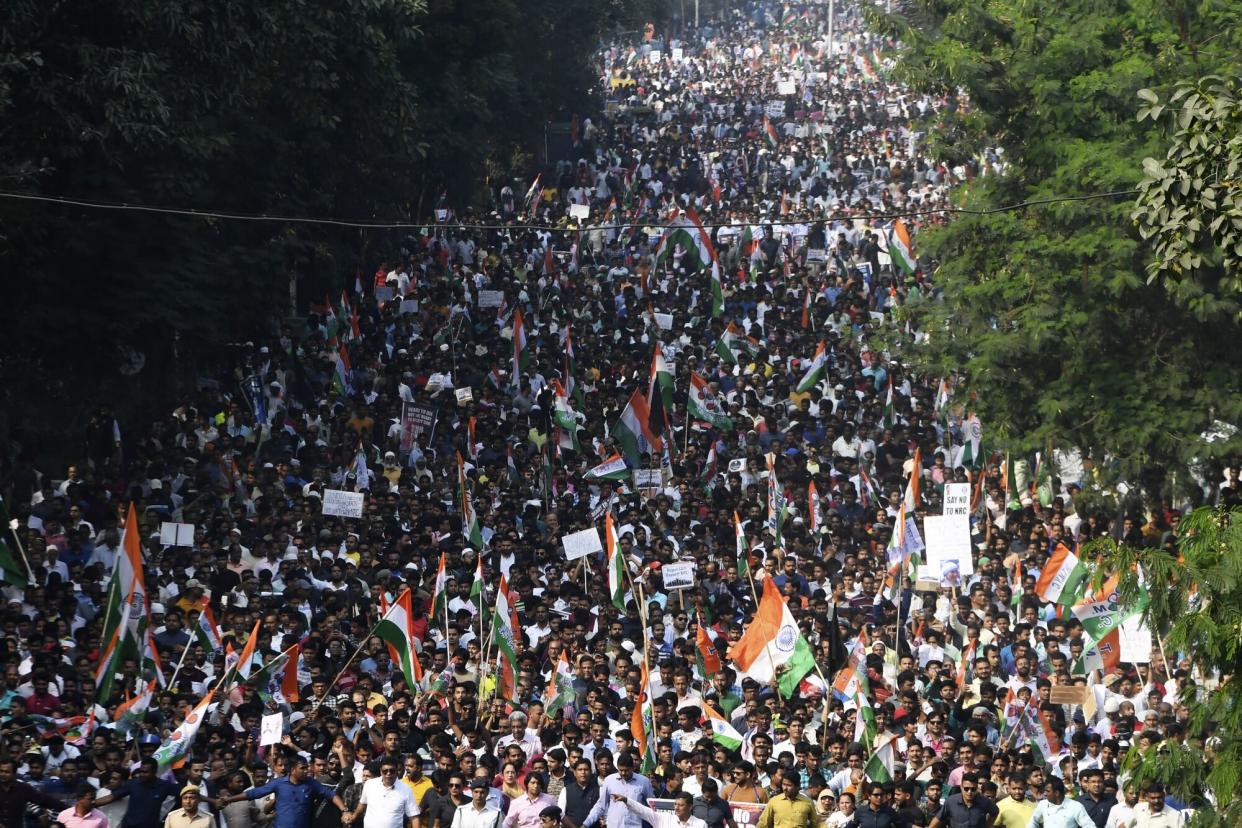India’s Controversial Citizenship Law Slammed by Opposition

(Bloomberg) -- As India heads into an election, follow Bloomberg India's channel on WhatsApp for how money and business intersect with politics and power. Sign up here.
Most Read from Bloomberg
Stock Traders Bracing for Worst Shrug Off Hot CPI: Markets Wrap
One of the Most Infamous Trades on Wall Street Is Roaring Back
US Core Inflation Tops Forecasts Again, Reinforcing Fed Caution
Ex-Wall Street Banker Takes On AOC in New York Democratic Primary
India implemented a religion-based law that’s seen as discriminatory toward Muslims, sparking a backlash from opposition parties, who accused Prime Minister Narendra Modi’s government of polarizing voters weeks before elections.
The Citizenship (Amendment) Act — which fast-tracks citizenship rights for immigrants from neighboring nations except for those who identify as Muslim — was enacted through a notification in the Gazette of India on Monday. Although the law was passed more than four years ago, it takes effect just days before India is expected to announce its election dates.
Questioning the timing of the notification of the rules just before the elections, Jairam Ramesh, the spokesperson for the Indian National Congress said it’s “evident that it is being done to polarize the elections.” Leaders in opposition-controlled states like Kerala and Tamil Nadu also slammed the move as divisive, vowing to oppose it.
The CAA prioritizes citizenship for Hindus, Sikhs, Buddhists and people of several other faiths from three neighboring Muslim-majority countries — Pakistan, Bangladesh and Afghanistan — who entered India before 2015. The Ministry of Home Affairs said Monday applicants can apply for citizenship through a web portal.
When the law was passed in 2019, it triggered violent protests and panic among many Indians who risked becoming stateless without proper documentation. The law is seen as a precursor to a proposed population register, which will require Indians to prove their citizenship.
If that happens, critics fear that Muslims who immigrated from the three neighboring countries and who have lived in India for decades without official papers may be deported or placed in detention camps. In Assam, which borders Bangladesh and is the only state that’s implemented a population register, 1.9 million people were rendered stateless by the process.
Modi has previously denied that the CAA law discriminates against Muslims. His ruling Bharatiya Janata Party is widely expected to return to power, buoyed by strong support from its majority Hindu base.
Opposition parties and state chief ministers issued statements Monday criticizing the timing and the motivation behind the government’s move.
“This is to divide the people, incite communal sentiments and undermine the fundamental principles of the Constitution,” Pinarayi Vijayan, Kerala’s chief minister, said in a post on social media platform X. “This move to stratify Indian citizens who have equal rights, must be opposed unitedly.” He added that the CAA won’t be implemented in his state.
Amit Shah, India’s home minister who has been a fierce advocate of the CAA, posted on X that the enactment of the law fulfills one of Modi’s promises, and would allow persecuted minorities in neighboring countries to acquire citizenship in India.
Opposition groups and activists fear the BJP will expand the population register in Assam to other states, as it’s promised. That would strip rights from tens of millions of Indians until they gain residency again through the CAA, although that path wouldn’t apply to Muslims.
According to the most recent census, Hindus account for 80% of India’s population of 1.4 billion, while Muslims make up about 14%.
(Updates with reaction from opposition parties)
Most Read from Bloomberg Businessweek
Gold-Medalist Coders Build an AI That Can Do Their Job for Them
Academics Question ESG Studies That Helped Fuel Investing Boom
Luxury Postnatal Retreats Draw Affluent Parents Around the US
Primaries Show Candidates Can Win on TikTok But Lose at the Polls
How Apple Sank About $1 Billion a Year Into a Car It Never Built
©2024 Bloomberg L.P.

 Yahoo News
Yahoo News 

